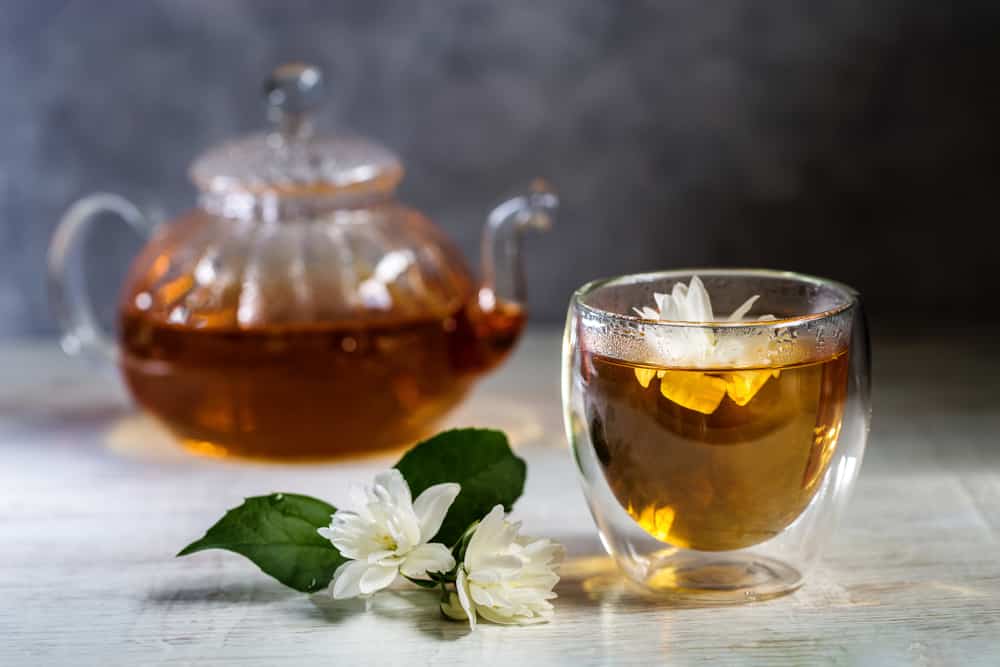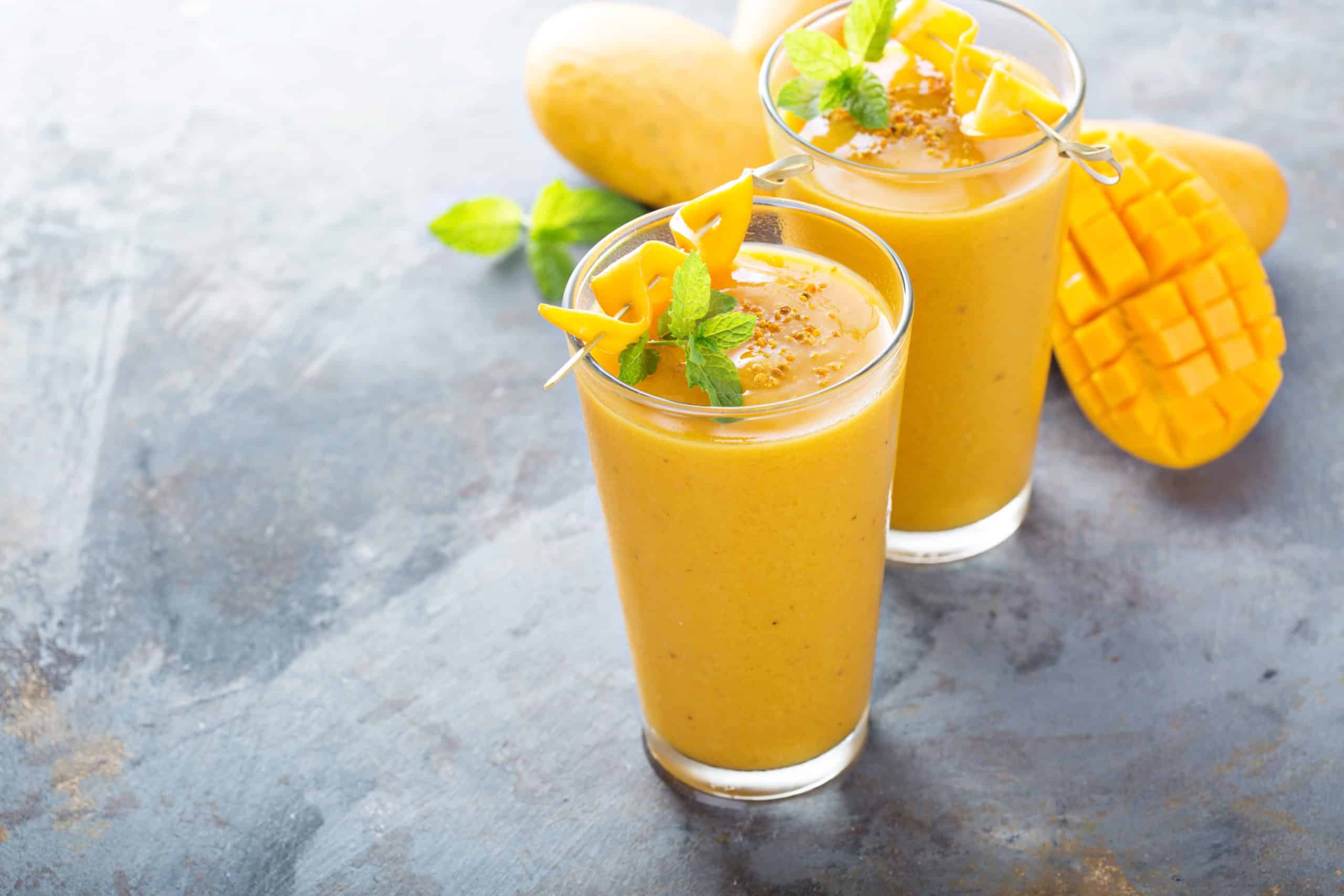When it comes to simple homemade remedies, particularly for colds, ginger tea with honey is probably one of the most common traditional concoctions. Even with the rise of modern medication, this remedy continues to be used by many, with reports of fantastic results.
But does tea with ginger and honey have other benefits or is it just good for soothing symptoms of cold and flu? In this article, we’ll find out about the science behind the benefits of ginger tea and its side effects.
What Is Ginger Tea with Honey?
As the name implies, this is a tea that is made with two primary ingredients: ginger root and some honey. Ginger is used as a spice in many dishes, but it has been used for thousands of years as a traditional medicine. Traditionally, this simple root is used for treating ailments such as colds, nausea, arthritis, migraines, bloating, and hypertension. Some people even use it as an aphrodisiac (13, 30)
Honey is the original sweetener. Most people are familiar with this thick and sweet golden liquid that’s produced by bees using the nectar of flowering plants.
The use of honey by humans can be traced as far back as 8,000 years ago during the Stone Age. Its uses have ranged from embalming the dead, the treatment of insomnia, skin disorders, eye ailments, imbalances of the lungs, anemia, and even as a contraceptive and a laxative (33).
While this tea is often made with just the two listed primary ingredients, you can modify a simple ginger tea with honey recipe and add more herbs and spices to make it spicier, more flavorful, and add more potential health benefits.
Health Benefits of Ginger Tea with Honey
To fully understand the possible benefits of ginger tea with honey, we must look at the potential health benefits of the two main ingredients to see the potentially positive impact it has on our health.
Health Benefits of Ginger
May Help Ease Motion Sickness
If you suffer from motion sickness and don’t have your medication at hand, a quick cup of ginger tea with honey could help you survive your journey with no incidents.
In a study published in the American Journal of Physiology-Gastrointestinal and Liver Physiology, researchers theorized that ginger helps prevent motion sickness by reducing nausea, tachygastria activity, and plasma vasopressin that are induced by circular vection (8).
May Prevent Nausea and Vomiting
Several studies have shown that ginger tea can be incredibly beneficial to people who suffer from nausea, particularly pregnant women, cancer chemotherapy patients, and those with motion sickness.
- A review of studies that included 1,278 pregnant women revealed that this root significantly improves the symptoms of nausea and poses little risk for spontaneous abortion or side effects such as heartburn and drowsiness. The study also found a trend toward improvement in vomiting, but it was not statistically significant (3).
- In 2015, a study in the European Review for Medical and Pharmacological Sciences found that instead of relying on traditional acid reflux-controlling drugs such as domperidone, levosulpiride, or metoclopramide, it may be reasonable to use this root as an alternative medicine for pregnancy-induced nausea and chemotherapy-induced nausea (5).
With that being said, it’s always smart to err on the side of caution, especially for at-risk people such as pregnant women.
One study published in 2017 warned that ginger could lead to adverse effects such as allergic reactions and blood-thinning in pregnant women (34).
Please speak to your doctor about using ginger for nausea if you are or may be pregnant.
Yanking yourself back in shape has never been so easy with our game-changing fitness app! Start transforming your life with BetterMe!
Improved Heart Health
According to a cross-sectional study published in 2017, daily ginger intake is associated with decreased risk for hypertension (high blood pressure) and coronary heart disease (CHD) (9).
Weight Loss and Management
If you’ve been looking for some weight loss tips and tricks, drinking ginger tea throughout the day may help you along on your journey – a theory that is supported by several scientific studies.
- A pilot study on 10 overweight men showed that having 2 grams of ginger powder dissolved in a hot water beverage for breakfast had a significant effect of ginger on the thermic effect of food – increasing the amount of energy it takes to digest and absorb the food they ate (12).
Increased thermogenesis can be good for weight loss as it means your body burns extra calories, but in this study, ginger consumption didn’t have any significant effect on total resting energy expenditure.
Researchers also found that this drink led to reduced hunger and a greater feeling of satiety, which can ultimately mean eating less throughout the day (12). This is in line with the calories in calories out theory, where a negative energy balance is created by eating less than your body needs, which can ultimately lead to weight loss.
2. A review in the Phytotherapy Research journal found that this root may help prevent obesity by increasing thermogenesis (calorie burning) and lipolysis (fat breakdown), suppressing lipogenesis (fat accumulation), inhibiting intestinal fat absorption, and controlling appetite (4).
Our blog 24 Weight Loss Smoothies offers a variety of nutritious blends to support your fitness journey.
Improves Blood Sugar Control
For people with diabetes, ginger tea could be beneficial for you.
- One trial published in the International Journal of Food Sciences and Nutrition saw that consuming 1,600 mg of ginger for 12 weeks led to improved blood sugar control and reduced A1C, insulin, triglycerides, and other markers among people with type 2 diabetes (31).
- A study published in 2015 suggested that by consuming just 2 grams of ginger powder a day, you may be able to help reduce the risk of some chronic complications of diabetes. The study results showed that ginger improved fasting blood sugar, hemoglobin A1c, apolipoprotein B, apolipoprotein A-I, apolipoprotein B/apolipoprotein A-I, and malondialdehyde in type 2 diabetic patients (32).
An important distinction to make here is that these benefits are more likely to occur if you drink plain ginger tea and not ginger tea with honey. Adding honey to your drink may spike your blood sugar, which could outweigh the potential benefits.
Helps with Bloating and Indigestion
A review published in 2019 found that ginger may help reduce bloating and cramping, prevent flatulence and indigestion, and decrease the pressure on the lower esophageal sphincter – all issues that cause stomach pain and indigestion (14).
This root is also traditionally used to help prevent colds, soothe sore throats, and ease congestion (13), and it may have beneficial effects on characteristics of nonalcoholic fatty liver disease (16), in addition to relieving pain caused by arthritis, menstrual cramps, and muscle pain (7,15,25).
Health Benefits of Honey
Contains Antioxidants
As honey is made from plant nectar, it contains plant chemicals that act as antioxidants. Antioxidants help protect your body from cell damage due to free radicals.
Several studies have shown that consuming honey may enhance your body’s antioxidant defense system and help reduce the risk of illnesses caused by oxidative stress (21, 24).
Improved Heart Health
As with ginger, honey has been suggested to help improve heart health.
- A recent study in the International Journal of Environmental Research and Public Health revealed that honey may protect from cardiovascular illnesses and improve heart function by lowering blood pressure, improving lipid metabolism, regulating your heartbeat, and preventing the death of healthy cells (6)
- Propolis, which is a honey-related product, has shown promise in test tube and animal studies as an effective antioxidant and anti-inflammatory agent with the potential to benefit cardiometabolic health (10).
Can Soothe Coughs and Sore Throats
Several studies on children (and their parents) have shown that this substance can help treat acute coughs in children, particularly when given to them before bedtime.
What’s even better is that unlike some medicines, honey has been found to have zero side effects, particularly in children (22,23,27). However, honey shouldn’t be given to infants under 12 months old due to the potential presence of botulinum spores.
Antibacterial Properties
According to a study published in 2011, honey – especially manuka honey – contains several antibacterial properties that can kill bacteria such as E. coli, which causes food poisoning, Staphylococcus aureus, which causes skin infections, and H. pylori, a bacteria that causes stomach ulcers and chronic gastritis (18).
Other potential health benefits of honey include treating diarrhea (1) and wounds. It has also been theorized to be useful in cancer treatment due to the many types of antioxidants that are present in it (20).
Read more: 8 Weight-Loss Tea Options With Science to Support the Pound-Slashing Claims
Side Effects of Ginger Tea with Honey
While these two ingredients are revered for their potential health benefits, ginger tea with honey can still have some unforeseen side effects. Here are some side effects you should look out for:
- Allergies – Allergies to honey and ginger are rare but not unheard of. If you start experiencing symptoms such as a runny nose, sneezing, swelling, watery eyes, an itchy throat, rashes, or hives, you should stop drinking this tea and get an allergy test to establish what is causing the reaction.
- Heartburn – While ginger can be used to help treat heartburn (26), research has also shown that in adults, this spice may sometimes cause heartburn (15)
- Can cause excessive bleeding – Drinking ginger tea with honey every day could lead to excessive bleeding after injury:
- It could inhibit platelet thromboxane, an agent that helps with blood clotting and the constriction of blood vessels (26)
- When taken with blood thinning medication it could increase the chances of bruising and bleeding. You should always talk to your doctor if you’re taking any medications before you add any new teas or supplements.
4. General discomfort – If your ginger tea with honey often has large amounts of ginger, this could lead to abdominal discomfort, diarrhea, or mouth and throat irritation (11).
If you wish to cinch your waist, tone up your bat wings, blast away the muffin top – our fitness app was created to cater to all your needs! BetterMe won’t give excess weight a chance!
FAQs
What is ginger tea with honey good for?
Ginger tea is believed to have many health benefits due to its anti-inflammatory and antioxidant properties. Sweetening it with honey can provide additional benefits such as soothing a sore throat or cough.
Some potential health benefits of this beverage include (30):
- Relieving nausea and vomiting: Ginger is traditionally used as a natural remedy for motion sickness, morning sickness during pregnancy, and chemotherapy-induced nausea.
- Reducing inflammation: The compounds in ginger have anti-inflammatory effects that may help to reduce pain and inflammation in conditions such as osteoarthritis and rheumatoid arthritis.
- Boosting immunity: Ginger and honey both contain antioxidants that may help strengthen the immune system and protect against illnesses.
- Improving digestion: Ginger has been found to stimulate the digestive system and help with issues such as bloating, indigestion, and stomach discomfort.
- Soothing sore throat: Ginger tea with honey can be a soothing remedy for a sore throat due to its antibacterial properties and potential for reducing inflammation.
Discover fascinating Ginger Lemon Tea Facts, including its benefits for health in our previous article.
Does ginger and honey tea help with bloating?
Ginger and honey tea can help with bloating largely because ginger is known for its digestive properties. Ginger can help stimulate the digestive system and may reduce bloating, gas, and other discomforts (2).
Honey isn’t directly linked to reducing bloating, but it can provide a natural sweetener for the tea without causing any additional digestive issues.
Is it good to consume ginger and honey on an empty stomach?
Drinking ginger and honey tea on an empty stomach isn’t proven to have any specific benefits or side effects. You can drink it on an empty stomach or with a meal – it doesn’t matter.
However, it can be a healthy way to start your day. Ginger tea is known for its digestive properties, can help stimulate the digestive system, and may reduce inflammation in the digestive tract. In addition, honey provides natural energy and antioxidants that can give you a boost in the morning.
If you have any preexisting health conditions or concerns, it’s always best to consult a healthcare professional before you make any changes to your diet or daily routine.
Can I drink ginger and honey tea at night?
Yes, you can drink ginger honey tea at night. It can be a soothing and relaxing beverage to enjoy before bed.
Ginger has calming properties that may help with sleep quality, and honey contains precursor compounds that may promote the production of melatonin (29), which helps with sleep (28). However, you should be mindful of your caffeine intake if you’re using caffeinated tea or adding other sources of caffeine to your ginger and honey tea. If you’re just adding ginger and honey to hot water, this is naturally caffeine-free.
The best way to know if ginger honey tea is suitable for your nighttime routine is to try it and see how you feel. If you experience any discomfort, it may be best to avoid consuming it close to bedtime.
Learn more about tea for weight loss and health in our post, Ginger Cinnamon Tea Facts.
The Bottom Line
The potential benefits of ginger tea with honey suggest that it’s a great herbal tea to have at hand. Not only is it such a simple brew to make, but a single cup has incredible potential health benefits. If you’re looking for a caffeine-free tea option to drink throughout the day or at night as a nightcap, we highly recommend this easy-to-make drink.
DISCLAIMER:
This article is intended for general informational purposes only and does not address individual circumstances. It is not a substitute for professional advice or help and should not be relied on to make decisions of any kind. Any action you take upon the information presented in this article is strictly at your own risk and responsibility!
SOURCES:
- A randomized clinical trial on the effect of honey in the acute gastroenteritis (2017, jrmds.in)
- A review of the gastroprotective effects of ginger (Zingiber officinale Roscoe) (2013, pubmed.ncbi.nlm.nih.gov)
- A systematic review and meta-analysis of the effect and safety of ginger in the treatment of pregnancy-associated nausea and vomiting (2014, ncbi.nlm.nih.gov)
- A systematic review of the anti-obesity and weight lowering effect of ginger (Zingiber officinale Roscoe) and its mechanisms of action (2018, pubmed.ncbi.nlm.nih.gov)
- Can nausea and vomiting be treated with Ginger extract? (2015, researchgate.net)
- Cardioprotective Effects of Honey and Its Constituent: An Evidence-Based Review of Laboratory Studies and Clinical Trials (2020, pubmed.ncbi.nlm.nih.gov)
- Double-blind placebo-controlled randomized clinical trial of ginger ( Zingiber officinale Rosc.) addition in migraine acute treatment (2018, pubmed.ncbi.nlm.nih.gov)
- Effects of ginger on motion sickness and gastric slow-wave dysrhythmias induced by circular vection (2003, journals.physiology.org)
- Evaluation of daily ginger consumption for the prevention of chronic diseases in adults: A cross-sectional study (2017, pubmed.ncbi.nlm.nih.gov)
- Evidence on the Health Benefits of Supplemental Propolis (2019, ncbi.nlm.nih.gov)
- Ginger (2020, nccih.nih.gov)
- Ginger consumption enhances the thermic effect of food and promotes feelings of satiety without affecting metabolic and hormonal parameters in overweight men: A pilot study (2012, ncbi.nlm.nih.gov)
- Ginger From Ancient Times to the New Outlook (2015, ncbi.nlm.nih.gov)
- Ginger in gastrointestinal disorders: A systematic review of clinical trials (2019, ncbi.nlm.nih.gov) m
- Ginger on Human Health: A Comprehensive Systematic Review of 109 Randomized Controlled Trials (2019, ncbi.nlm.nih.gov) n
- Ginger on Human Health: A Comprehensive Systematic Review of 109 Randomized Controlled Trials (2020, ncbi.nlm.nih.gov) o
- Ginger Supplementation in Nonalcoholic Fatty Liver Disease: A Randomized, Double-Blind, Placebo-Controlled Pilot Study (2016, ncbi.nlm.nih.gov) p
- Honey: its medicinal property and antibacterial activity (2011, ncbi.nlm.nih.gov)
- Honey (2020, fdc.nal.usda.gov)
- Honey and Health: A Review of Recent Clinical Research (2017, ncbi.nlm.nih.gov)
- Honey as a Potential Natural Antioxidant Medicine: An Insight into Its Molecular Mechanisms of Action (2018, hindawi.com) s
- Honey for acute cough in children (2018, ncbi.nlm.nih.gov)
- Honey for treatment of cough in children (2014, ncbi.nlm.nih.gov)
- Honey with high levels of antioxidants can provide protection to healthy human subjects (2003, pubmed.ncbi.nlm.nih.gov)
- Influence of Ginger and Cinnamon Intake on Inflammation and Muscle Soreness Endued by Exercise in Iranian Female Athletes (2013, ncbi.nlm.nih.gov)
- Integrative Treatment of Reflux and Functional Dyspepsia in Children (2014, ncbi.nlm.nih.gov)
- Is honey an effective treatment for acute cough in children? (2016, pubmed.ncbi.nlm.nih.gov)
- Melatonin and Sleep (2023, sleepfoundation.org)
- Serotonin, melatonin and their precursors and metabolites and vitamin D3 derivatives in honey (2023, ncbi.nlm.nih.gov)
- The Amazing and Mighty Ginger (n.d., ncbi.nlm.nih.gov)
- The effect of ginger consumption on glycemic status, lipid profile and some inflammatory markers in patients with type 2 diabetes mellitus (2014, pubmed.ncbi.nlm.nih.gov)
- The Effects of Ginger on Fasting Blood Sugar, Hemoglobin A1c, Apolipoprotein B, Apolipoprotein A-I and Malondialdehyde in Type 2 Diabetic Patients (2015, ncbi.nlm.nih.gov) C
- Traditional and Modern Uses of Natural Honey in Human Diseases: A Review (2013, ncbi.nlm.nih.gov)
- Which potential harms and benefits of using ginger in the management of nausea and vomiting of pregnancy should be addressed? A consensual study among pregnant women and gynecologists (2017, biomedcentral.com)











